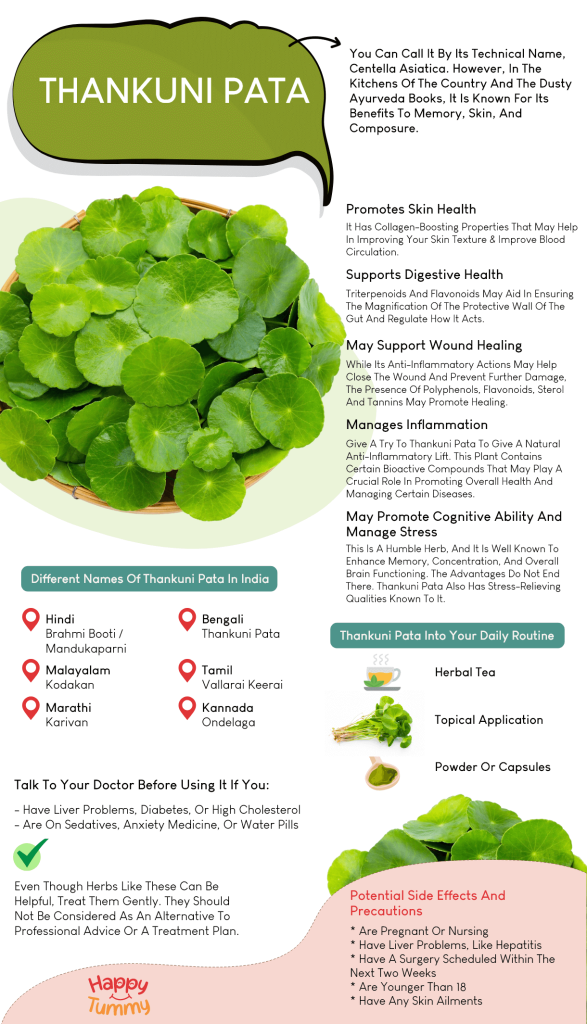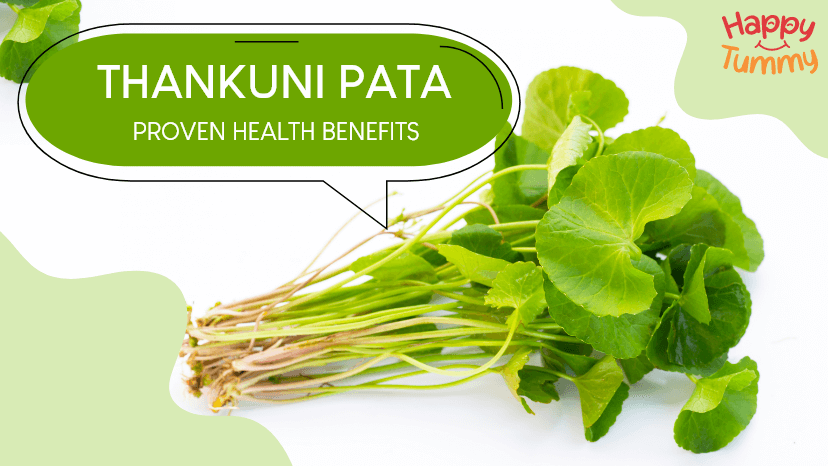Table of Contents
It is said that there are often the most effective remedies already grown in the garden rather than in supermarkets—Great Thankuni Pata, which is the centuries of wisdom wrapped up in a green leaf.
You can call it by its technical name, Centella Asiatica. However, in the kitchens of the country and the dusty Ayurveda books, it is known for its benefits to memory, skin, and composure.
More than a herb to accompany it, as it has been for people who learned to trust the soil ages ago.
Why then is it that Thankuni Pata is so powerful and yet so quiet in its power?
Ancient monks used it to help steady their breath and train their thoughts; it is the antioxidants and renewing compounds that scientists now praise.
Feeling nervous and want to alleviate moments of anxiety or focus on something, or perhaps you have irritated or dry skin that needs relief, or you just want nature to take back your day?
This is a modest-appearing leaf that will help. In this article, we will strive to state reasons, based on evidence, as to why you must invite Thankuni Pata into your life.
In case you are interested to learn more about its green wisdom, read on.

About Pata Thankuni Pata
Centella Asiatica, also known as Thankuni Pata, is an herb that is allegedly highly medicinal, one of the healthiest and most nutritious plants in the world. It has a slightly bitter, fresh taste, bright green appearance, and small, round leaves.
It is wild in India, principally in tropical, moist regions of that portion of the globe, and flourishes in marshy and waterways.
The leaves are traditionally used as an Ayurvedic medicine, and are usually drunk when fresh as a tea extract, or applied topically as fresh leaves, or as pastes.
It is also available in a supply form that can be taken in the form of powder or capsules to provide various health benefits.
Different names of Thankuni Pata in India
Gotu Kola, as it is called in the West, Thankuni Pata is called in different regions, by regional names, based on language and custom:
- Bengali: Thankuni Pata
- Hindi: Brahmi Booti / Mandukaparni
- Tamil: Vallarai Keerai
- Malayalam: Kodakan
- Kannada: Ondelaga
- Marathi: Karivan
Although this herb is called differently in the various regions of the country, it is valued throughout the nation as a powerful medicinal plant.
Health Benefits of Thankuni Pata
The following are just a few of the incredible health benefits of Thankuni Pata that have been glorified over the centuries, making them useful in traditional medicine.
#1 Promotes Skin Health
Have acne scars, acne, or some first wrinkles? Thankuni Pata could be the plant spirit you need. This green leaf contains beneficial antioxidants and healing compounds and may revive weary skin.
It has collagen-boosting properties that may help in improving your skin texture & improve blood circulation, giving a glow to the complexion.
Calm and gentle, the leaf may also pacify redness and irritation. The scientists single out asiaticoside, madecassoside, and triterpenoids as the skin-strengthening and healing powerhouses found in Thankuni Pata, working together to heal and restore the skin. [2]
To get the best result, brew it into a herb tea or combine it with a paste or infused oil and allow the plant to work its magic where it is required.
#2 May Support Wound Healing
Thankuni is known for its anti-oxidant, anti-ulcer, and anti-inflammatory properties. Because of these features, the herb has been widely studied to support wound healing.
While its anti-inflammatory actions may help close the wound and prevent further damage, the presence of polyphenols, flavonoids, sterols, and tannins may promote healing.
Anti-ulcer properties of Centella Asiatica may be helpful for skin or leg ulcers.[3]
#3 Supports Digestive Health
Experiencing bloating, acidity, or sluggish digestion? Thankuni Pata may help your gut feel better, too.
Herbalists have used the leafy plant to find relief from an upset stomach throughout the generations.
Not only does Thankuni Pata put out the fire, but it may also regulate bowel activity.
Scientists come to the rescue of tradition: substances such as triterpenoids and flavonoids may aid in ensuring the magnification of the protective wall of the gut and regulate how it acts.[4] [5]
To get the mild spell of it, do it by taking a very light tea, or mustering a bit of fresh leaves and some black salt to chew on after any one of your meals.
Aashirvaad Atta, in collaboration with a panel of learned dietitians, has developed the Digestion Quotient, which examines your digestive health and assigns a digestive power score on a 1-100 scale. Find your Digestive Quotient by taking this 2-minute test.
#4 Manages Inflammation
Do you have general joint pains, swellings, or, among other things, any inflammations that last over an extended period? Give a try to Thankuni Pata to give a natural anti-inflammatory lift.
This plant contains certain bioactive compounds that may play a crucial role in promoting overall health and managing certain diseases. [6]
The two may help signal that leads to inflammation in your body.
It may provide relief without the side effects of conventional medicine, because it protects against oxidative stress and counteracts hyperactive immune reactions.
Research has found that regular use of it in the form of herbal tea, or as a paste on painful parts, may manage the pain and also elevate the overall well-being.[7]
#5 May Promote Cognitive Ability and Manage Stress
Also known as the Indian Pennyweight, Thankuni Pata is not only a plant that will enhance the beauty of your garden, but it is also full of benefits in relation to your brain health.
In Ayurveda, it is referred to as medhya rasayana, or, in other words, it is a substance that may improve intelligence and promote long life.
This is a humble herb, and it is well known to enhance memory, concentration, and overall brain functioning. The advantages do not end there.
Thankuni Pata also has stress-relieving qualities known to it. Frequent intake or use of this herb may assist in managing anxiety and calming the mind and mental fatigue.
In case you feel overwhelmed or mentally exhausted, Thankuni Pata could be a natural, gentle remedy to enhance mental clarity and foster emotional well-being.
How to Incorporate Thankuni Pata Into Your Daily Routine
- Herbal Tea: Put a small handful of fresh Thankuni Pata leaves into 2 cups of water and boil for 5 to 10 minutes. Then strain the leaves and drink the tea. It is a super-easy beverage that can assist in digestion, a healthy mind, and a lovely boost to your immune system.
- Topical Application: Make a smooth paste of the young leaves of Thankuni Pata. Apply the paste sparingly over acne areas, minor cuts, or any irritated area of the skin. This is a natural remedy that can subdue redness and allow healing of wounds a bit quicker.
- Powder or Capsules: Thankuni Pata also comes in the form of powder. You may consume it in capsules or add the powder to a glass of warm water, a smoothie, or a glass of juice. It is also a fast and straightforward way of ensuring you have it as a part of your routine. For healthy individuals, around 3 g of the powder or 8–10 ml of the juice can be taken daily.
- Culinary Use: Fresh leaves of Thankuni Pata can be chopped and added to chutneys, soups, or salads. Besides imparting a pleasant, sparkling, and fresh taste, they provide the dish with a healthy boost.
However, it is recommended to consult your healthcare professional for the right dosage, as excessive consumption can cause various side effects.
Potential Side Effects and Precautions
Thankuni Pata, known as Gotu Kola, is safe for most people when taken in regular doses. Some folks might feel mild side effects like headaches, upset stomach, or mild dizziness.
To avoid these, start with a tiny dose. If you feel good, you can gradually take more.
Put it on your skin, and some people get mild redness or irritation. To check how your skin reacts, do a patch test on a small spot before using it on a larger area.
Don’t use Thankuni Pata if you:
- If pregnant or nursing
- Have liver problems, like hepatitis
- Have a surgery scheduled within the next two weeks
- Are younger than 18
- Have any skin ailments
Talk to your doctor before using it if you:
- Have liver problems, diabetes, or high cholesterol
- Are on sedatives, anxiety medicine, or water pills
Bottom Line
Thankuni Pata is a fantastic herb loved in traditional medicine for supporting skin health, brain health, digestion, and reducing inflammation.
Its healing compounds support fresh tissue growth and offer gentle protection when used mindfully in everyday life.
You can sip it in tea, sprinkle it on food, or rub it on your skin. This makes it a handy partner on your journey to feeling better.
Even though herbs like these can be helpful, treat them gently. They should not be considered as an alternative to professional advice or a treatment plan.
Long-term health requires consuming a balanced diet each day. Before trying a new herbal product, consult your doctor to ensure it fits into your care plan.
Frequently Asked Questions
You can drink Thankuni Pata tea or use the leaves in cooking every day within moderate amounts. Still, it’s smarter to use it in cycles. Try 2 to 6 weeks on, then take a break to avoid side effects.
For healthy adults, Thankuni Pata is usually safe. But pregnant or breastfeeding women, kids under 18, and anyone with liver or kidney problems should stay away. It’s always a good idea to ask a doctor before starting.
Absolutely! You can put Thankuni Pata on your skin for acne or blemishes. Just do a small patch test on your arm first to check for allergies.
















